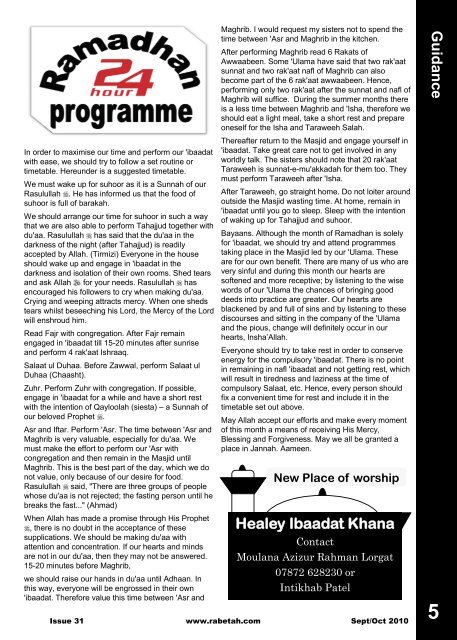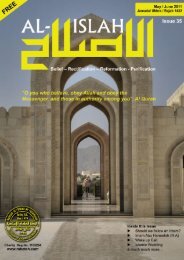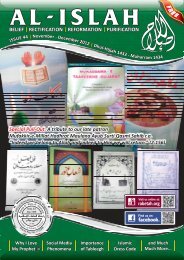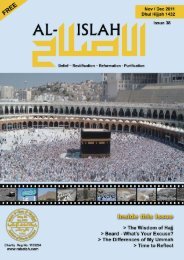Ramadhan - Rabetah
Ramadhan - Rabetah
Ramadhan - Rabetah
Create successful ePaper yourself
Turn your PDF publications into a flip-book with our unique Google optimized e-Paper software.
Guidance<br />
In order to maximise our time and perform our 'ibaadat<br />
with ease, we should try to follow a set routine or<br />
timetable. Hereunder is a suggested timetable.<br />
We must wake up for suhoor as it is a Sunnah of our<br />
Rasulullah . He has informed us that the food of<br />
suhoor is full of barakah.<br />
We should arrange our time for suhoor in such a way<br />
that we are also able to perform Tahajjud together with<br />
du'aa. Rasulullah has said that the du'aa in the<br />
darkness of the night (after Tahajjud) is readily<br />
accepted by Allah. (Tirmizi) Everyone in the house<br />
should wake up and engage in 'ibaadat in the<br />
darkness and isolation of their own rooms. Shed tears<br />
and ask Allah for your needs. Rasulullah has<br />
encouraged his followers to cry when making du'aa.<br />
Crying and weeping attracts mercy. When one sheds<br />
tears whilst beseeching his Lord, the Mercy of the Lord<br />
will enshroud him.<br />
Read Fajr with congregation. After Fajr remain<br />
engaged in 'ibaadat till 15-20 minutes after sunrise<br />
and perform 4 rak'aat Ishraaq.<br />
Salaat ul Duhaa. Before Zawwal, perform Salaat ul<br />
Duhaa (Chaasht).<br />
Zuhr. Perform Zuhr with congregation. If possible,<br />
engage in 'ibaadat for a while and have a short rest<br />
with the intention of Qayloolah (siesta) – a Sunnah of timetable set out above.<br />
our beloved Prophet . STORIES OF PIOUS WOMEN<br />
May Allah accept our efforts and make every moment<br />
Asr and Iftar. Perform 'Asr. The time between 'Asr and of this month a means of receiving His Mercy,<br />
Maulana Ashraf Ali Thanwi (Rahmatullahi Alayh)<br />
Maghrib is very valuable, especially for du'aa. We<br />
must make the effort to perform our 'Asr with<br />
congregation and then remain in the Masjid until<br />
Maghrib. This is the best part of the day, which we do<br />
not value, only because of our desire for food.<br />
Rasulullah said, "There are three groups of people<br />
whose du'aa is not rejected; the fasting person until he<br />
breaks the fast..." (Ahmad)<br />
When Allah has made a promise through His Prophet<br />
, there is no doubt in the acceptance of these<br />
supplications. We should be making du'aa with<br />
attention and concentration. If our hearts and minds<br />
are not in our du'aa, then they may not be answered.<br />
15-20 minutes before Maghrib,<br />
we should raise our hands in du'aa until Adhaan. In<br />
this way, everyone will be engrossed in their own<br />
'ibaadat. Therefore value this time between 'Asr and<br />
Maghrib. I would request my sisters not to spend the<br />
time between 'Asr and Maghrib in the kitchen.<br />
After performing Maghrib read 6 Rakats of<br />
Awwaabeen. Some 'Ulama have said that two rak'aat<br />
sunnat and two rak'aat nafl of Maghrib can also<br />
become part of the 6 rak'aat awwaabeen. Hence,<br />
performing only two rak'aat after the sunnat and nafl of<br />
Maghrib will suffice. During the summer months there<br />
is a less time between Maghrib and 'Isha, therefore we<br />
should eat a light meal, take a short rest and prepare<br />
oneself for the Isha and Taraweeh Salah.<br />
Thereafter return to the Masjid and engage yourself in<br />
'ibaadat. Take great care not to get involved in any<br />
worldly talk. The sisters should note that 20 rak'aat<br />
Taraweeh is sunnat-e-mu'akkadah for them too. They<br />
must perform Taraweeh after 'Isha.<br />
After Taraweeh, go straight home. Do not loiter around<br />
outside the Masjid wasting time. At home, remain in<br />
'ibaadat until you go to sleep. Sleep with the intention<br />
of waking up for Tahajjud and suhoor.<br />
Bayaans. Although the month of <strong>Ramadhan</strong> is solely<br />
for 'ibaadat, we should try and attend programmes<br />
taking place in the Masjid led by our 'Ulama. These<br />
are for our own benefit. There are many of us who are<br />
very sinful and during this month our hearts are<br />
softened and more receptive; by listening to the wise<br />
words of our 'Ulama the chances of bringing good<br />
deeds into practice are greater. Our hearts are<br />
blackened by and full of sins and by listening to these<br />
discourses and sitting in the company of the 'Ulama<br />
and the pious, change will definitely occur in our<br />
hearts, Insha‘Allah.<br />
Everyone should try to take rest in order to conserve<br />
energy for the compulsory 'ibaadat. There is no point<br />
in remaining in nafl 'ibaadat and not getting rest, which<br />
will result in tiredness and laziness at the time of<br />
compulsory Salaat, etc. Hence, every person should<br />
fix a convenient time for rest and include it in the<br />
Blessing and Forgiveness. May we all be granted a<br />
place in Jannah. Aameen.<br />
New Place of worship<br />
Healey Ibaadat Khana<br />
Contact<br />
Moulana Azizur Rahman Lorgat<br />
07872 628230 or<br />
Intikhab Patel<br />
Issue 31 www.rabetah.com Sept/Oct 2010<br />
5
















